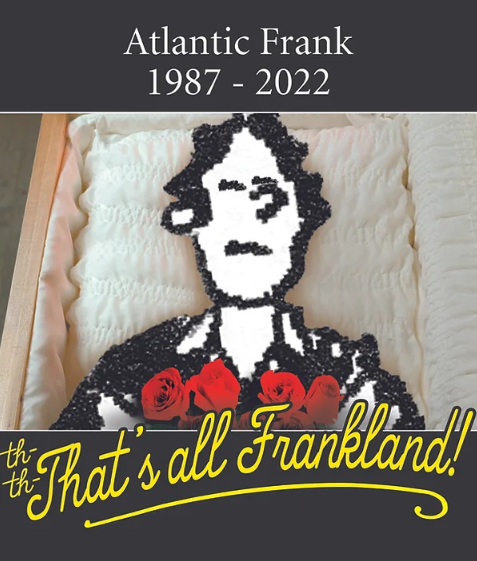The Halifax-based satirical magazine Frank has announced its demise after more than three decades of publication.

A notice on the publication’s website says the publishers “regret to announce the death of Frank Magazine Atlantic … which occurred on September 14, 2022.”
A photo montage depicting the cartoon figure who appeared on the magazine’s masthead, lying in a coffin with his eyes closed, accompanies the announcement.
The website says the publication, which is distinct from the Ottawa-based magazine of the same name, had operated for 35 years.
It was widely sold at supermarket checkouts and was available online for a subscription fee, and the announcement says subscribers will be reimbursed.
The editor of the publication, Andrew Douglas, was not immediately available for comment.

The magazine has received praise and criticism over the years for its journalism, with some commentators noting that in the past it would break stories that other media then followed.

Get breaking National news
Stephen Kimber, a faculty member at the University of King’s College school of journalism, writing and publishing in Halifax, said he used to frequently purchase the magazine, regarding it as something of “a guilty pleasure.”
“It had a heyday when they were satirical, they were nasty, and they would uncover things people didn’t want uncovered, but they had a focus on politicians, businessmen and media stars,” he said in an interview on Thursday.
“There was a period when they were breaking stories,” he recalled, referring primarily to the 1990s.
“They did some of the first stories about (former premier) Gerald Regan’s issues with women, they did stories about (former premier) John Buchanan’s trust funds. They were an important journalistic publication in this province for a period of time.”
More recently, the publication was the first to publish a story revealing that senior members of an internal RCMP team tasked with providing information to Nova Scotia’s mass shooting inquiry were married to two top female officers involved in the response. The two Mounties on the team were subsequently replaced due to conflict of interest concerns.
However, Kimber said in recent years he felt the emphasis often shifted too far away from knocking the powerful off their pedestals.
- Tumbler Ridge B.C. mass shooting: What we know about the victims
- ‘We now have to figure out how to live life without her’: Mother of Tumbler Ridge shooting victim speaks
- Trump slams Canada as U.S. House passes symbolic vote to end tariffs
- Oysters from Stellar Bay Shellfish brand recalled for norovirus risk
“Many of those being exposed were ordinary people who had nothing to say in terms of public policy or business or anything else,” he said.
“I stopped making it a regular thing to buy.”
In 2017, the magazine came under criticism for a cartoon that depicted El Jones, an African Nova Scotian poet who was attending a demonstration, as having a jutting chin and sloping forehead.
The magazine modified the image after critics described the image as racist and launched campaigns to remove the magazine from stores. Douglas also apologized to readers, saying, “In our mind, we didn’t use (a) racist character, but having said that we also understand that can be totally subjective.”
Jones, who is now the Nancy’s chair in women’s studies at Mount Saint Vincent University, said in an interview at the time she viewed the image as a throwback to racist images in magazines in the 1800s that depicted African men and women as having features closer to primates than Caucasians.
This report by The Canadian Press was first published Sept. 15, 2022.








Comments
Want to discuss? Please read our Commenting Policy first.